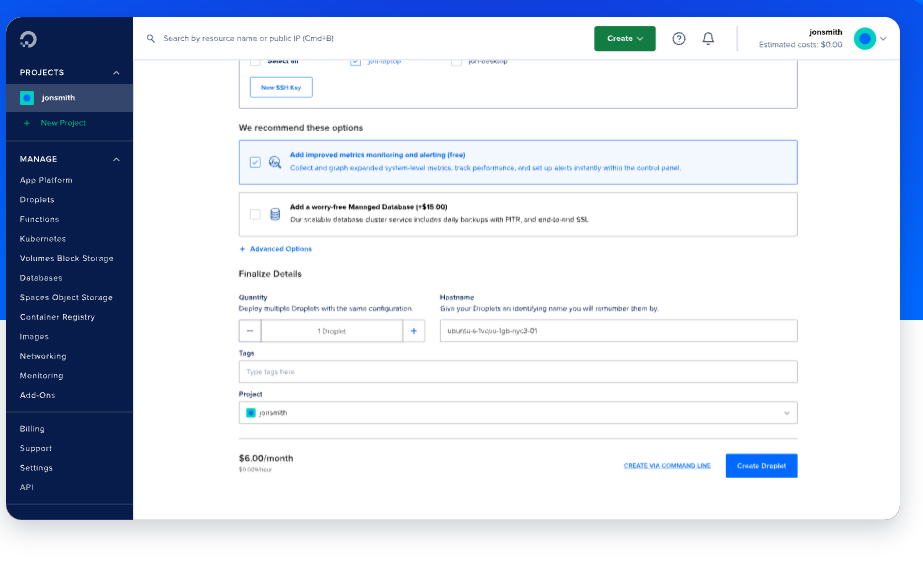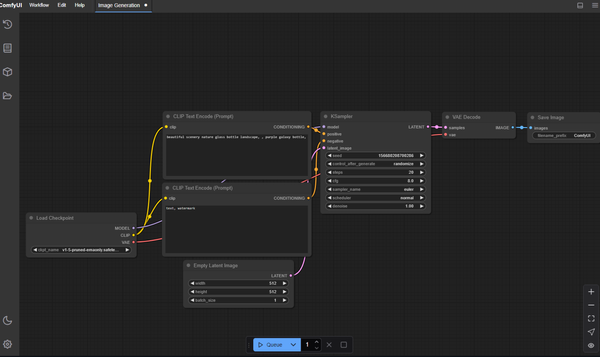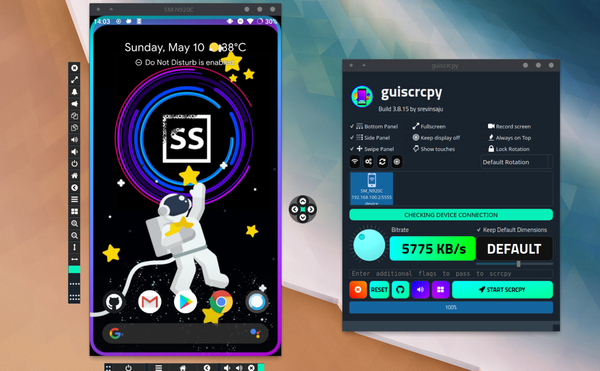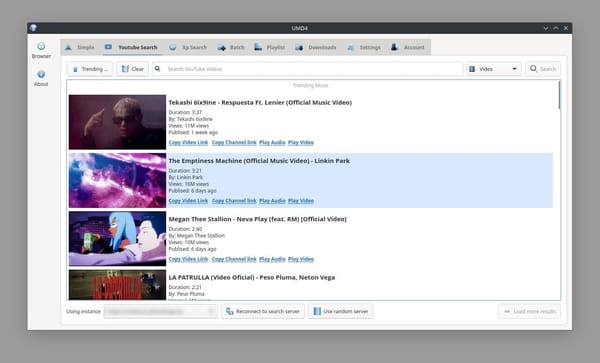Which Linux Distro to Use on DigitalOcean? 6 Options and Our Recommendations
Table of Content
DigitalOcean is a popular cloud infrastructure provider that supports various Linux distributions, making it a flexible choice for developers and businesses. This article will review the supported Linux distros, including Ubuntu, Debian, Fedora, CentOS, AlmaLinux, and Rocky Linux. We'll also highlight DigitalOcean's advantages, such as custom images and a marketplace with over 246 applications.
DigitalOcean has been our go-to platform for years, powering both our own and client projects. We've used it extensively to set up, test, and deploy a wide range of applications, including our custom solutions and various open-source tools. Its flexibility and dependability have made it a key part of our development process.
To help you decide if DigitalOcean suits your development needs, we'll include a referral offer for new users, a feature list, and an FAQ section.
Supported Linux Distributions on DigitalOcean
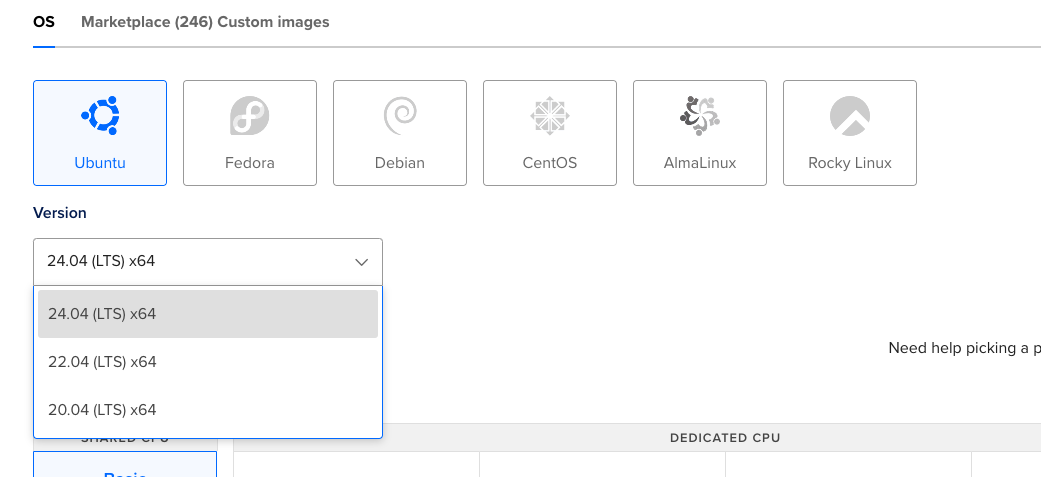
1- Ubuntu
Ubuntu, first released in 2004, is a Debian-based Linux distribution developed by Canonical. It has become one of the most popular Linux distributions worldwide, known for its ease of use and regular release cycle.
Ubuntu's popularity stems from its user-friendly approach, making it a favorite among both beginners and experienced users.
Pros:
- User-Friendly: Ubuntu is known for its intuitive interface, making it accessible for beginners and experienced developers.
- Strong Community Support: It has extensive documentation and a large community that provides help and resources.
- Regular Updates: Canonical releases regular updates, including security patches and new features.
Cons:
- Resource-Intensive: Compared to other lightweight distributions, Ubuntu may require more system resources.
- Less Customizable: The default settings and user interface can be less customizable than some other distros.
2- Debian
Debian, one of the oldest Linux distributions, was first released in 1993. It's known for its stability and adherence to the principles of free software.
While not as widely used as Ubuntu on desktops, Debian is highly respected and forms the basis for many other distributions, including Ubuntu.
Pros:
- Stability: Debian is known for its stability and reliability, making it an excellent choice for production environments.
- Package Management: It uses the APT package management system, which simplifies software installation and updates.
- Flexibility: Debian can be customized extensively and supports a wide range of hardware.
Cons:
- Slower Release Cycle: The stable version may not include the latest software or features due to its slower release cycle.
- Steeper Learning Curve: New users may find it less intuitive than Ubuntu.
3- Fedora
Fedora, sponsored by Red Hat, was first released in 2003. It's known for its cutting-edge features and serves as the upstream source of the commercial Red Hat Enterprise Linux distribution. Fedora is popular among developers and enthusiasts who prefer the latest technologies.
Pros:
- Cutting-Edge Features: Fedora is often at the forefront of adopting new technologies and software.
- Regular Releases: It has a predictable release schedule, ensuring users have access to the latest features.
- Strong Community: Similar to Ubuntu, Fedora has a vibrant community that offers support and resources.
Cons:
- Short Lifecycle: Each release is only supported for about 13 months, requiring more frequent upgrades.
- Less Stability: Being more cutting-edge can lead to occasional instability.
4- CentOS
CentOS (Community ENTerprise Operating System) was first released in 2004 as a free, community-supported computing platform functionally compatible with its upstream source, Red Hat Enterprise Linux (RHEL).
It was widely used in enterprise environments until the shift to CentOS Stream in 2020.
Pros:
- Enterprise-Grade: CentOS is based on RHEL and is widely used in enterprise environments for its stability.
- Free: It provides a cost-effective alternative to RHEL with similar features.
Cons:
- Shift to CentOS Stream: The transition to CentOS Stream has made it a rolling-release model, which may not suit all users.
- Less Community Focused: It lacks the same level of community engagement compared to other distributions.
5- AlmaLinux
AlmaLinux is a relatively new Linux distribution, first released in 2021. It was created as a community-owned and governed alternative to CentOS, following the announcement of CentOS Stream.
Despite its recent inception, it has quickly gained popularity among former CentOS users.
Pros:
- Direct CentOS Replacement: Designed as a drop-in replacement for CentOS, it provides stability and long-term support.
- Free and Open Source: AlmaLinux is community-driven and free to use.
Cons:
- Newer Project: Being relatively new, it may lack some community resources compared to established distributions.
- Fewer Features: It may not have as many cutting-edge features as other distributions like Fedora.
6- Rocky Linux

Rocky Linux, like AlmaLinux, was created in response to the CentOS Stream announcement. It was first released in 2021 and was founded by Gregory Kurtzer, one of the original founders of CentOS.
It aims to be a 100% bug-for-bug compatible with Red Hat Enterprise Linux.
Pros:
- Community-Driven: Founded by one of the original CentOS creators, it aims to provide a stable and free alternative.
- Focus on Enterprise: It is designed for production environments, providing the reliability needed for enterprise applications.
Cons:
- Still Gaining Traction: As a newer distribution, it may not have as extensive a community or resources as others.
- Limited Customization: It focuses on stability, which may limit customization options.
Recommendations
Based on our evaluation of supported Linux distributions, we recommend Ubuntu, Debian, and Fedora for different use cases:
- For Beginners: Ubuntu stands out as the ideal choice, thanks to its user-friendly interface and extensive support resources. It's an excellent starting point for new developers.
- For Stability and Reliability: Debian excels in production environments where stability is paramount. Its long support cycles minimize disruptions, ensuring smooth operations.
- For Cutting-Edge Features: Fedora is the go-to option for those eager to experiment with the latest technologies. It's perfect for developers who want to stay at the forefront of innovation.

Benefits of Using DigitalOcean
DigitalOcean offers several advantages for developers looking to deploy applications:
1- Custom Images
Users can create and use custom images for their Droplets, allowing for easy deployment of specific software stacks tailored to their needs.
2- Extensive Marketplace
DigitalOcean's marketplace features 246+ applications that can be deployed with a single click. This includes tools for web development, databases, and various frameworks, significantly reducing setup time (DigitalOcean Docs).
3- Scalability
Users can scale their infrastructure effortlessly with DigitalOcean, adjusting resources as needed to accommodate growing traffic or application demands.
4- Developer-Focused Features:
DigitalOcean provides tools like Kubernetes, managed databases, and Spaces for object storage, all designed with developers in mind.
6- Cost-Effective Pricing:
DigitalOcean offers competitive pricing, allowing users to optimize their budgets without sacrificing performance.
7- Easy Setup and Management:
With an intuitive control panel, users can easily manage their infrastructure without extensive technical knowledge.
8- Robust Documentation and Community Support:
DigitalOcean has an extensive library of tutorials and a supportive community, making it easy for developers to find solutions to their questions.
Special Offer: Get $200 Credit for Free!
If you're new to DigitalOcean, you can take advantage of our referral link to get $200 credit for free. This offer allows you to explore and experiment with the platform without any upfront costs.
Whether you're testing out different Linux distributions or deploying applications, this credit can help you get started.

